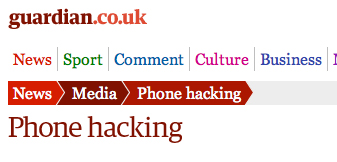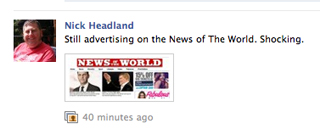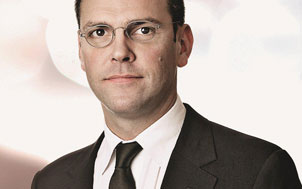British journalism has just undergone one of the most radical weeks in several decades.
“Rocked,” “chaos,” “shocking” — use whatever adjectives you like, but news this week that the News of the World (NOTW) tabloid hacked into the phones of child murder victims, families of London’s July 7, 2005 terror attacks, and parents of soldiers killed in action has turned the stomachs of much of Britain.
Now Rupert Murdoch’s News International has shut down the NOTW after 168 years. This weekend will be the last edition of the world’s biggest-selling, English-language newspaper.
UPDATE (7/15/11): While many news outlets around the web have been touting the NOTW as the “biggest-selling English-language newspaper,” the real honor for that distinction goes to the Times of India. While NOTW likely had the highest circulation of all Sunday newspapers in the U.K., it did not lead in circulation among other papers in the world.
The public appetite for information, particularly about celebrities and major news stories, is insatiable — until it becomes an intrusion into your own life. Is the duty to provide information more important to society than individual privacy? Does the civil “public interest” test outweigh the private protection of an individual?
‘Hackgate’
The phone-hacking scandal, or “hackgate” as some have dubbed it on Twitter, is a long-running saga, and The New York Times Magazine investigation last year remains the best and most detailed single explanation. Meanwhile, The Guardian has steadfastly kept attention on the matter.
As a basic summary, a reporter or private investigator would dial into the cell phone of a celebrity, politician or other public figure and then use a four-digit PIN to access the voice mail. Many people never even change the PIN on their mobile voice mail or know how to do that. Investigators might pose as the celebrity in question and call the cell carrier saying they lost their PIN and need to reset it.

The technique first began to unravel in 2005 when messages to Britain’s royal family aides were appearing read and saved, even though they hadn’t heard them.
That eventually led to the conviction of NOTW reporter Clive Goodman and private investigator Glenn Mulcaire. Police said Mulcaire’s notebook had thousands of names and corresponding details of cell phone numbers and PINs.
Since then, attention has been on which celebrities, members of Britain’s Parliament or other public figures had their phones hacked — a practice which is illegal, except by security services with a court order.
A Widening Scandal
That was until this week when it emerged that Mulcaire had allegedly accessed the voice mail of missing 13-year-old Milly Dowler and deleted messages, in some cases giving the impression she was still alive to worried family members. On June 23, a man was convicted of murdering the schoolgirl, so it was still fresh in the public’s mind.
The revelations have continued, with more alleged hacking victims: the parents of murdered children Holly Wells and Jessica Chapman in 2002, the family members of victims of the London terror attacks on July 7, 2005, and the parents of fallen soldiers from Iraq and Afghanistan.
It’s also been revealed that up to five of Britain’s Metropolitan Police may have been paid bribes of more than 100,000 pounds ($159,610) for information, from the same force that was supposed to be investigating the allegations of phone hacking, throwing the entire voracity of the inquiry into question.
So, how widespread is the practice of phone hacking? There have been reports — by The New York Times feature last year in particular — that other newspapers may have bought information obtained through phone hacking, or phone hacked directly, or that the technique was allegedly common at the NOTW. Although there have been a handful of arrests from within the NOTW, nobody has ever been charged beyond the original reporter and private investigator. No other newspapers have yet been identified by police.
Pushing the Boundaries
I know a fair number of reporters, and not one of them would engage in illegal activity for a story. Have we sometimes pushed boundaries? Of course. Do we sometimes feel a bit questionable afterwards? Yes. We’re human.
When a newspaper told me they wanted a picture of school pupils but with “no fatties, uglies or ethnics,” they apologized but that was the style of the paper. That’s not illegal, but it’s not the journalism I believe in.
Stories are regularly “spiked” because of a paper’s biases or agenda. Thankfully, the UK has enough publications that almost any story can end up in print eventually, despite those barriers.
The NOTW story is still moving rapidly. Advertisers have been pulling out of the paper. Ford was the first, very early on after the revelations and before any social media campaign really got going.
Social Media Pushes Advertisers Out
Mitsubishi on Tuesday said it was “morally right” to suspend advertising with the paper. Based on a suggestion from one of its Facebook followers, it’s diverting the money to a children’s charity instead.
As the week has gone on and the public has identified which advertisers were in the weekly paper — particularly thanks to data from the Guardian — many other companies have pulled the plug, including the Royal British Legion on Thursday morning.

Tesco, the UK’s largest food retailer, said it wanted the police investigation to take its course, even while people on Twitter and Facebook bombarded it with demands to pull its advertising.
The Co-operative Group confirmed it heard from members by email, phone and Facebook and Twitter while it was already reviewing its advertising, which it has now suspended.
Airlines, phone companies, Britain’s post office and others have all pulled their advertising. One parody story even joked about Fish Refusing to Be Wrapped in the News of the World.
Other social media suggestions have included canceling subscriptions to Sky TV (i.e., BSkyB) which News International is trying to buy, or avoiding shops that sell the paper.
Closing NOTW
And then late on Thursday afternoon, News International Chairman James Murdoch, the son of Rupert Murdoch, told staff that the good work of the paper had “been sullied by behavior that was wrong — indeed, if recent allegations are true, it was inhuman and has no place in our company.”

“The News of the World is in the business of holding others to account. But it failed when it came to itself,” he said.
Ultimately, the paper was in decline already. The NOTW’s circulation fell to 2,606,397 in April 2011 from 4,104,227 in October 2001, a drop of 36.5 percent. That is significant pressure on any paper.
Total sales for 10 Sunday papers were 9,082,065 as of April. That’s plummeted from 14,044,396 in October 2001, a drop of 35.3 percent. But the UK remains one of the most read newspaper markets in the world.
One non-press colleague said yesterday: “Everyone talks about freedom of the press. They’ve had their chance. Take it away.”
Hundreds of people have worked for the NOTW as staff, hundreds more as contributors, and thousands more have been willingly quoted in the paper.
The actions of a handful of reporters or those they hire does not in any way dissuade me from the importance of journalism, a free press or a “smart, fearless journalism,” as Mother Jones magazine aptly puts it.
Feeding the News Appetite
I personally don’t know any reporters who lack souls. We don’t exist in realms of black or white, good or evil. But I know all of us are under pressure to feed the ever-increasing news appetite, often within ever-shrinking offices of demanding companies with expectant shareholders.
In one case, a colleague was required to supply one story each week on “Harry Potter” author JK Rowling, no matter what. “No” wasn’t an answer to the boss — and the results were achieved perfectly legally.
To interpret pressure as justifying unethical and illegal practices is a choice of individuals. But they are culpable, as are any bosses who knew of the actions.
However wrong the hacking activities were and are, many of those leaping to condemn them are not without bias themselves. Broadsheet newspapers are almost gloating at the peril of the tabloid press which disgusts, but outsells, them.
Parliament members have repeatedly been caught in adulterous or worse behavior by the tabloid press over the years, but would never dare speak out against News International prior to the current public furor.
And government opponents see this as a chance to extract blood from Prime Minister David Cameron for making the mistake of hiring former NOTW editor Andy Coulson as his communications chief (who might be arrested tomorrow).
Final Consequences
Ultimately, we have a clash of what my retired philosophy professor father refers to as the “social duty to provide as much information as possible,” and the duty of “non-injury to others.” So which trumps which?
The question now is what will happen in this Sunday’s last ever NOTW. What will the NOTW put on its front page? (One tweet suggested the word “Sowwy” and a picture of a kitten.) Will it come back in another form within weeks?
When the Sun published lies about the Hillsborough disaster in 1989, it arguably never recovered sales in Liverpool and is still reviled by some. That may well have happened to the NOTW, but would have required more than 2.6 million customers to turn away from the celeb gossip and “real life” coverage they are in the habit of devouring. Has the Murdoch empire now successfully drawn a line under this sordid tale by closing the paper?
It’s only one product — the conflicting appetites for information and privacy are not going anywhere anytime soon.
Disclaimer: I have, a few years ago now, been paid for freelance stories and tips by the Scottish editions of the News of the World and the daily sister paper, The Sun, and more recently by the Sunday Times. I stand by those individual stories.
Photo of Rupert Murdoch by David Shankbone via Wikipedia.
Tristan Stewart-Robertson is a Canadian freelance reporter based in Glasgow, Scotland, operating as the W5 Press Agency.

